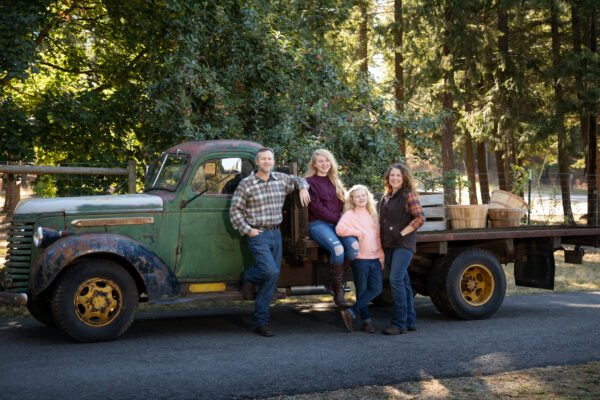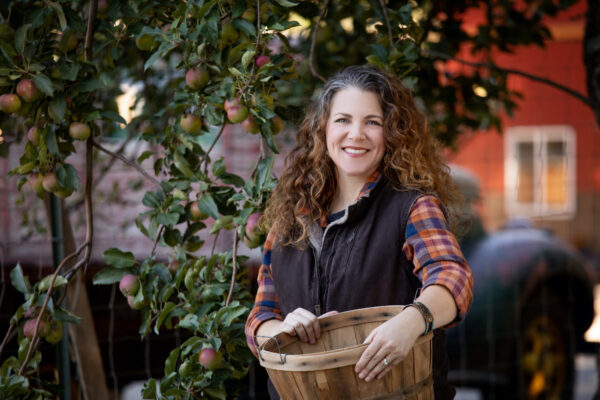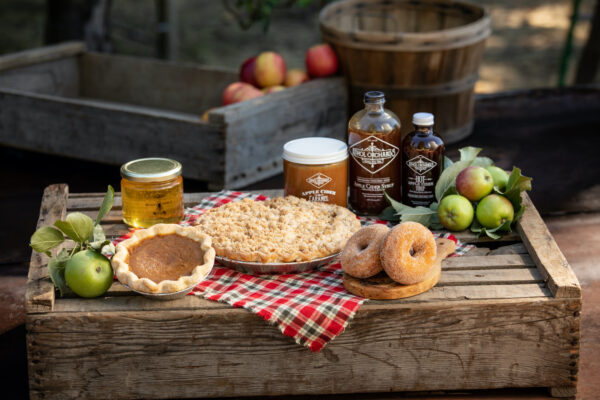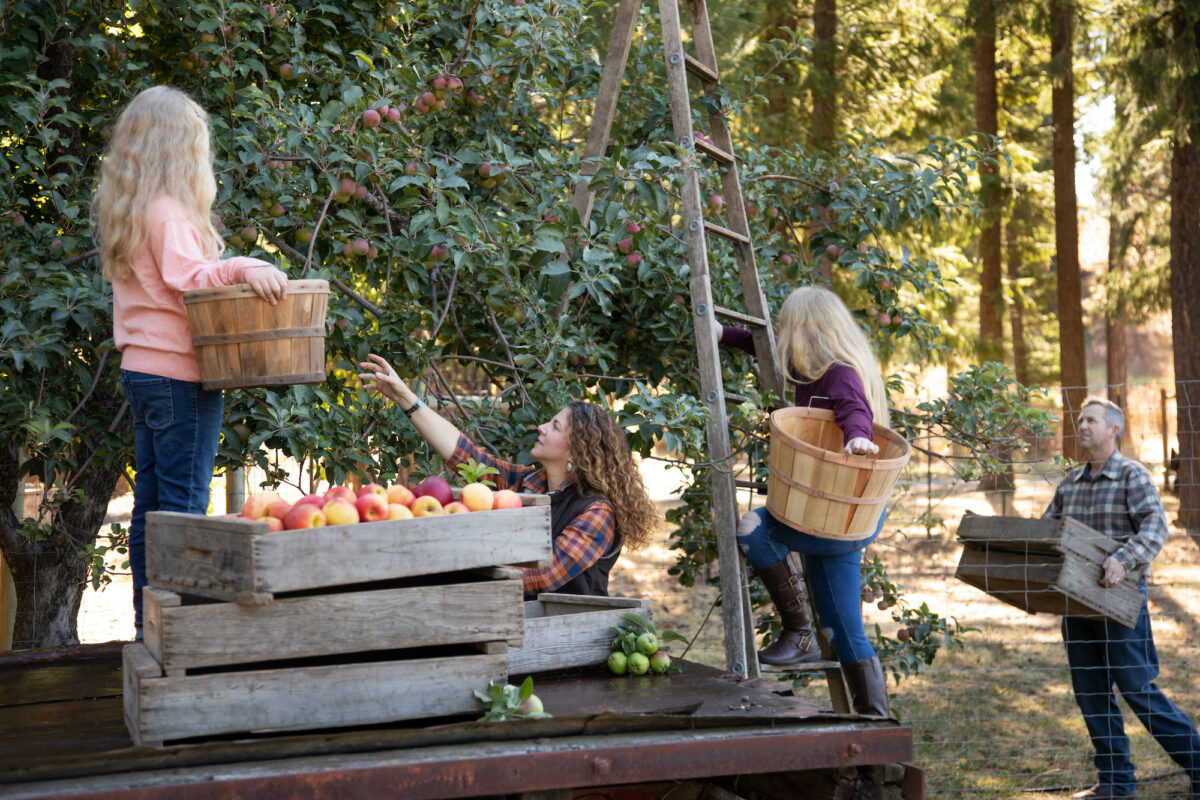The fundamentals of life at Athol Orchards are simple: a tight-knit family, a love for all things apple, and a deep appreciation for mountain air and American soil.
Located in the northern reaches of Idaho, Athol Orchards is owned and operated by the Conley family: Erreck, Nikki, daughters Mackenzie (13) and Madelyn (10), and Nikki’s mother Carole. While it is most known to the public for its historical apple varieties, delectable apple cider syrup, and Idaho-harvested maple syrup, the Conley family looks at the orchard as a token of the American dream: strong family foundations, plenty of hard work (oftentimes backbreaking, as Nikki said), and the traditional, family-owned farm life.
In the beginning, many told Nikki and Erreck they’d bitten off more than they could chew. But since moving to Idaho from the West Coast in January of 2016, the family has been chipping away at their vision, little by little; just six years ago, Nikki was a professional graphic designer working in a Northern California metropolis, parked in front of a computer day in and day out, while memories of the quiet Californian mountain town where she spent her childhood bloomed in her mind.

“When I was 3 years old, my family wanted to seek a quieter life for me and my siblings, so we moved to the eastern foothills of central California in a little town called Springfield. It was the ideal small town,” said Nikki. “The Sequoia National Forest was pretty much our backyard, and we had a lot of these multi-generational, commercial apple orchards that were being grown in high-elevation mountains there.”
Crisp apples and fresh mountain air are braided into Nikki’s childhood, so much so that she often asked her father if they could become apple farmers. The glow of a computer screen became a headache as the mother of two pictured the quality of life she wanted for her daughters.
Building an Orchard From Scratch
Nikki and Erreck didn’t have a lick of agricultural experience of their own—Nikki herself had cycled through graphic design, teaching, and the medical field, trying to find her lifelong career—but while the orchard dream was still far removed from reality, it remained within arms’ reach.
“We wanted to seek a quiet life for our kids. A slower life, away from the big population densities in California where we were. I don’t know if this happens to all parents, but our minds really started changing in the ways we thought about the world, after watching how things have changed and the world got so fast, unpredictable, scary.”
Northern Idaho checked all of Nikki’s boxes for climate, environment, safety. She, her high school sweetheart, and their kids headed east. And with the town of Athol nearly rhyming with the word apple, it just felt a universal sign to Nikki that it was time to make her childhood dream come true.
Crucial to this was her husband’s willingness to change his own career path, move states, and walk alongside his wife in her new endeavor; while apples alone may not have been a convincing-enough argument, Nikki finding her true calling surely would. Erreck is a 23-year Air Force veteran who remained in government work until joining Nikki in the full-time orchard venture. Carole lives on the orchard and assists in the operation as well, helping with gardening, watering, and tending the berry patches.
The apples and their byproducts are just a delicious bonus. “I’m the dreamer and Erreck is very much the doer. Everything we’ve done, we’ve done together right alongside our girls,” Nikki said.

What to most people is just a household kitchen staple is to Nikki a fruit with a rich, intricate history, which has fascinated her for years. There are multi-volume book series, historians, and national conventions dedicated to the apple, and the varieties grown at Athol are unlike those found on grocery store shelves. Some varieties were lost and found again when abandoned American homesteads, dating back to the 18th century, were rediscovered and explored—the ancient apple trees found on those homesteads were “gifts from our ancestors,” Nikki said.
“I learned about all of these lost, old, historical varieties that really tied in with my love of American history. All the pieces started to fall into place for me.” Nikki now delights in sharing her knowledge through her orchard, which she said also functions as a living history farm.
Back to Nature
Preserving history and providing agricultural education are important, Nikki explained. Agricultural exposure in public school is minimal, and, with the threshold to enter the commercial farming industry so high, she wants impressionable young children to learn the vital role that agriculture—not just commercial farming—can play for a person, a community, and America as a whole. “We want to change the way kids see agriculture, whether it be becoming beekeepers, having their own orchard, or raising Nigerian goats for cheese and raw milk. Public education doesn’t have the time to touch on agriculture anymore, and that’s why we need to hold on to the family farms in our country,” she said.
Nikki does not aspire to run a commercial apple farm. She sees herself as a curator of apples, and her farm a preservation orchard, with its 1.5 acres and 120 trees, holding space in the present for apple varieties that held so much significance in the past. She has plans to plant more trees on an additional 16 acres next spring.

Athol Orchards is perhaps most known for its signature apple cider syrup. A lover of natural and holistic ingredients harvested straight from the earth, Nikki didn’t like the thought of her family using artificial syrups, so she set out to create a syrup product from her apples. She did not expect that she would soon be selling out of the product at farmers markets—where customers gushed that the syrup was happiness in a bottle or like Christmas for the tastebuds—and shipping to all 50 states and internationally.
Nikki took a similar approach with maple syrup, the supermarket varieties of which can be loaded with additives, after a visit to New England where maple farms thrive. “The whole idea and tradition of maple syrup stuck in my heart just as fast as the apples did,” she said.
A Rewarding Dream
So, what is it like living in the shadow of the Rockies, where your nearest neighbors are apple trees? It is an “amazing silence,” Nikki said, free of the traffic, construction, and general cacophony that steals the quiet away from urban places. The morning of her American Essence interview, she rose early to find wild turkeys foraging the orchard for fallen apples while her Nigerian dwarf goats brayed to hail the morning; in the mountains, the nighttime often leaves a milky fog behind that casts the forest surrounding the orchard into haziness. Elk may emerge to try to sneak a few apples off the trees, and while the Conley family has not yet experienced any firsthand, moose, wolves, and cougars loom in this very much still wild and untamed land.
Metro California, choked and uncomfortable like a person pulling at a turtleneck, seemed a distant memory.
“The forest is quiet, and the atmosphere is cool. The earth is damp, you can smell the soil under the grass. We are a forest-edge environment, which means we let the native grass and wildflowers grow in the springtime,” Nikki said.
The most rewarding of it all has been watching her family slow down—not only watching her dream of apples and syrups blossom, but her dream of true, unadulterated happiness find its way into her daughters’ hearts.
“It’s been a very fulfilling thing for my kids to watch us develop this business. They’ve now realized that they can be entrepreneurs themselves, and they don’t have to work for somebody else, or work for the system. They can build a life for themselves and have a life that they want. They’ll be able to provide for their own families and not have to work on somebody else’s clock and somebody else’s dime,” Nikki said.
The local community has welcomed the orchard and the Conley family with open arms, their message of a more purposeful, slower life included. Nikki recently experienced an accident that left her injured, and the community swooped in to help with farm operations. “People are tired and weary of this fast-paced world. They’re losing connection to humans,” Nikki said. “Our farm has become this place where people can come, and they don’t take out their cell phones, and there’s this kindness and this camaraderie that takes place here.”
Athol Orchards has provided so much more to Nikki than apple pie and maple syrup. She and her family love this land from mountain peak to soil, growing their roots deeper than those of their apple trees. And while Nikki’s father—who played such an important role in taking her to orchards and hearing her childhood dreams of becoming an apple farmer—passed on long before the orchard came to fruition, Nikki looks out over her work and knows he’d be proud, perhaps even smiling down.




